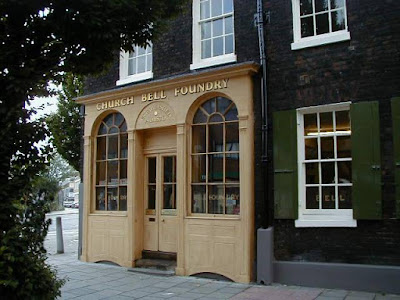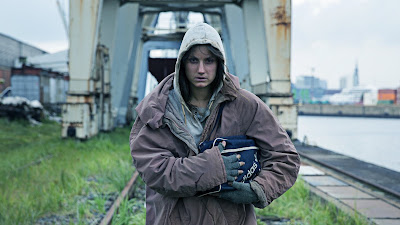Whitechapel is life in all its wild and rotten splendor;
beside it, the rest of the world seems a tomb.
The streaming series
RIPPER STREET might have escaped me were it not for an accidental meet up with an enthusiastic review, followed by a binge-watch and absorption from the first moment. Set near the time that the ghoulish Jack the Ripper serial-murdered his prostitute victims, the 5–season police drama is particularly energetic, suspenseful, and literate, thanks to prolific writer-creator, Richard Warlow (below).
Real life persons (events, and the Dublin shooting locale) lend historicity, for example Edmund Reid and Fred Abberline, the former played by series lead,
Matthew MacFadyen (
Pride and Prejudice,
Anna Karenina), and the latter by
Clive Russell (
Game of Thrones,
Outlander); Abberline was Reid’s superior (below).
Reid headed criminal investigation at H Division in Whitechapel where Ripper did his crimes. Although you’d expect so, the series does not directly address the murders. They add dolorous atmosphere, a guilty prod to the police for work unfinished, in that Ripper was never caught. (Episode 1.1, a copy-cat murder, is as close as Div H police get.) In the main, Ripper Street is a deep dive into the late 19th century world of London’s East End and the battles by its protagonists to solve crimes, keep the peace, and have some semblance of private life and love.
Reid’s particular sidekick is his forensic pathologist, an American with a shady past, Homer Jackson, played by
Adam Rothenberg (above, second l). Jackson is a “two-penny sawbones, a snake-oil-pushing clap doctor” whose outside-the-box genius for uncovering crimes in the bones and tissues of victims is invaluable to Reid. Homer has a wife from whom he is estranged, Long Susan (far l) a criminally inclined, heart-of-gold brothel madam played by
MyAnna Buring (
Twilight Saga,
Downton Abbey).
Fellow officer(ctr. r) is Inspector Bennet Drake, the craggy
Jerome Flynn (GoT
's Bronn) and one more main player, Rose, the prostitute who seeks to better herself, is played by
Charlene McKenna (far r). Drake’s gnarly charisma is a helpful offset to MacFadyen’s buttoned-up Inspector Reid — the center spoke around which action turns, “attached to Whitechapel as if by lead weights on a river bed”.
The Dickensian world of Whitechapel comes to life with assorted guest players such as the winsome (Ms)
Charlie Murphy (above, l, of
Rebellion,
The Last Kingdom), and the very appealing
Damien Molony (above, r) in an episode that stews together romance, Irish politics, and a battle for adoption of either alternating or direct-current electricity.
Joseph Mawle (shown above, of
The Hallow and
Clapham Junction) has a recurring role as the evil-doer Inspector Shine, revealing his unshowy acting chops (above).
Iain Glen (GoT, Downton Abbey);
Jonas Armstrong (
Robin Hood); the talented
David Dawson (Alfred the Great in The Last Kingdom) as newspaper hound and dandy Fred Best (below);
Lydia Wilson,
John Heffernan,
Josh O’Connor,
Amanda Hale, and more familiar faces appear from BBC, PBS and other networks' series.
Whitechapel itself is an affecting character. St Mary’s, a small local chapel dating from the 1300’s, lent its name to the area which became a slum in Victorian times as Irish, Jewish, Indian, and other foreigners crowded in to this and other East End neighborhoods. ‘Elephant man’ Joseph Merrick (below) lived and died in Whitechapel, often on exhibit as a curiosity (one story is his).
By the 1880’s there were reportedly 60 brothels and 1200 prostitutes. Noxious businesses located there, the sounds and smells of tanners, brewers, and metal shops comfortably distant from the affluence of central London. The
Whitechapel Bell Foundry headquarters (below), dating from the era of Elizabeth I, cast Westminster Abbey bells, Big Ben, and the Liberty Bell of Philadelphia.
The East End has been in our sights over and again. In the 1590s Shoreditch, East End, Shakespeare plied his trade at the Curtain Theater (
Shakespeare in Love).The late 1990’s series
Bramwell featured a woman doctor operating on this turf and telling stories of East End poor;
Call the Midwife (1950’s-60’s)is a more recent take, and
Tom Hardy’s recent
Taboo features East End locations. However, Warlow’s
Ripper Street is likely the most consistent, visceral, and frenetic portrait of this small piece of real estate.
Division H policed a bit over a mile and 67,000 poor, including factories, tenements, brothels, and pubs. Their stories addressed labor conflict like the Match Girls strike and discrimination against Jewish, Chinese, and Indian minorities.
The ever-present thread of women seeking to control their own lives and bodies is revealed in Long Susan’s career, for which she pays and pays more. New technology arrives — the telephone and micro-reader, blood typing, finger printing, and the invention of film become lynchpins for murder.

Rose, the prostitute, is manipulated into being photographed by a pornographer who strangles his subjects in front of the camera; we are introduced to the amazing invention of moving images, sure to become cash cows for future pornographers. A gang of child criminals is led by an adult man who directs the boys to capture girls for sale to groups of men; Reid traces the source of the Plague to a “Molly House” (gay/transgender brothel); a train robbery results in the deaths of 55 people; Long Susan finances a hospital and is convinced to treat victims of back-alley abortions when an affiliated male doctor is discovered using poor women for experimentation and sterilization; the stockholders of a shipping company are dismayed to find that a woman is the inventor of a new engine that could save the company; a work house administrator is found to have murdered sickly children in his care.

Four seasons serve up a steady diet of these social-justice-themed police procedurals, each complex and tightly wound, but season five resolves the relationships of the main characters while bringing to justice a poor fellow who having seen his mother eaten by wolves, bites his victims to death: “
homo homini lupus est — man is wolf to man” (that's Jonas Armstong, above, as Nathaniel).
Curiosity if not hope, is satisfied because these tales of Whitechapel do not end with a warm glow like episodes of
Call the Midwife. Rather, life and loss go on: “We are doomed to the ragged purgatory of these streets...Lady Justice holds us...to her righteous tit.” (Inspector Shine). And, as creator Warlow writes, there are diamonds to be mined from pain.
Ripper Street streams now via
Netflix.
The above post was written by our
monthly correspondent, Lee Liberman


























































